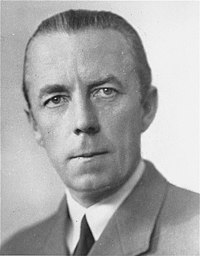Folke Bernadotte

Count Folke Bernadotte af Wisborg (January 2, 1895 - September 17, 1948), was a Swedish diplomat noted for his negotiation of the release of 15,000 prisoners [1] from the German concentration camps in World War II and for his assassination by radical Zionists during his service as United Nations mediator in Palestine.
Early life
He was the son of Oscar Bernadotte, Count of Wisborg (formerly Prince Oscar of Sweden) and his wife, née Ebba Henrietta Munck af Fulkila. Oscar, the son of King Oscar II of Sweden and Norway, married without the King's consent in 1888, thereby leaving the royal family, and was (in 1892) given the hereditary title Count of Wisborg by the Grand Duke Adolphe of Luxembourg.
World War II diplomacy
Bernadotte, while vice-president of the Swedish Red Cross in 1945, attempted to negotiate an armistice between Germany and the Allies. At the very end of the war he received Heinrich Himmler's offer, from April 24th, of Germany's complete surrender to Britain and the United States, provided Germany was allowed to continue resistance against the Soviet Union. The offer was passed on to Prime Minister Winston Churchill and President Harry S. Truman.
Just before the end of World War II he gained much good will leading a rescue operation transporting interned Norwegians, Danes and other inmates from German Concentration Camps to hospitals in Sweden. In the "White Buses" of the Bernadotte-expedition 15,000 persons were liberated, mostly scandinavians but also some Jews.
UN mediator
Following the 1947 UN Partition Plan, on May 20, 1948, Folke Bernadotte was appointed the United Nations' mediator in Palestine. This made him the first official mediator in the history of the world organization. In this capacity, he succeeded in achieving a truce in the 1948 Arab-Israeli War and laid the groundwork for the United Nations Relief and Works Agency for Palestine Refugees in the Near East.
Assassinated in Jerusalem by Lehi
Bernadotte was assassinated on September 17th, 1948 by the Zionist underground group Lehi, sometimes known as the Stern Gang. The assassination was approved by the three-man Lehi 'center': Yitzhak Shamir, Natan Yellin-Mor and Yisrael Eldad, and planned by the Lehi operations chief in Jerusalem, Yehoshua Zetler. A four-man team lead by Meshulam Markover ambushed Bernadotte's motorcade in downtown Jerusalem and team member Yehoshua Cohen fired into Bernadotte's car. Bernadotte and his aide, UN observer Colonel André Serot were killed. The following day the United Nations Security Council condemned the killing of Bernadotte as "a cowardly act which appears to have been committed by a criminal group of terrorists in Jerusalem while the United Nations representative was fulfilling his peace-seeking mission in the Holy Land".[2]
Lehi took public credit for the murders in the name of a previously unknown group, but Lehi's role was never in doubt. Lehi was forcibly disarmed and many members were arrested, but nobody was ever charged with the murders. Yellin-Mor and another Lehi member Schmuelevich were charged with belonging to a terrorist organization. They were found guilty but immediately released and pardoned (Yellin-Mor had meanwhile been elected to the first Knesset). Years later, Cohen's role was uncovered by David Ben-Gurion's biographer Michael Bar Zohar while Cohen was working for Ben-Gurion as a security guard. The first public admission of Lehi's role in the murder was made in 1977 (Yediot Aharonot, Feb 28).
His peace efforts in the Arab-Israeli conflict of 1947/8
Three days after his death, a report describing Bernadotte's peace efforts was published. It included the following proposals:

- To transform the first lull in the fighting into a permanent peace, or at least a ceasefire, and determine the final borders of the Jewish and Arab states in Palestine
- To grant the Negev desert to the Arab state and the Galilee to the Jewish state
- To internationalize Jerusalem
- To grant control over the Arab sections of Palestine to the Arab states (in effect, Transjordan)
- To ensure that the port in Haifa and the airport in Lydda serve both the Jewish and Arab sections of the country, and the neighboring Arab states
- To return the Arab refugees to their homes
- To establish a Reconciliation Committee as the first step toward achieving a lasting peace in the region.
The government of Israel rejected the proposals. After Bernadotte's death, American mediator Ralph Bunche was appointed to replace him. Bunche eventually negotiated a ceasefire, signed on the Greek island of Rhodes. See 1949 Armistice Agreements.
Footnotes
- ^ Security Council 57 (1948) Resolution of 18 September 1948.
References
- Kushner, Harvey W. (2002). Encyclopedia of Terrorism. Sage Publications. ISBN 0761924086
- Schwartz, Ted (1992). Walking with the Damned: The Shocking Murder of the Man Who Freed 30,000 Prisoners From the Nazis. Paragon House, New York. ISBN 1557783152
